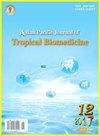迷迭香酸可改善卵清蛋白致敏大鼠的气管平滑肌反应能力和肺部病理变化
IF 1.7
4区 医学
Q3 TROPICAL MEDICINE
引用次数: 0
摘要
评估迷迭香酸对卵清蛋白致敏大鼠气管平滑肌反应性和肺病理变化的影响。 将大鼠随机分为六组:对照组、哮喘组和使用地塞米松(1 毫克/千克;口服)或三种剂量的迷迭香酸(0.5、1 和 2 毫克/千克;口服)治疗的哮喘组。为了诱发哮喘,大鼠腹腔注射和吸入卵清蛋白。21 天后,收集支气管肺泡灌洗液和肺部样本进行组织病理学分析。此外,还测定了白细胞总数和差值。 结果表明,迷迭香酸治疗组的气管平滑肌对甲氧胆碱的反应明显低于哮喘组。此外,迷迭香酸还能降低白细胞计数以及嗜酸性粒细胞、单核细胞和中性粒细胞的百分比,同时增加淋巴细胞的百分比。使用迷迭香酸治疗后,卵清蛋白诱发的肺部病理变化明显改善。 迷迭香酸可改善卵清蛋白致敏大鼠的气管平滑肌反应性和肺部病理变化。本文章由计算机程序翻译,如有差异,请以英文原文为准。
Rosmarinic acid improves tracheal smooth muscle responsiveness and lung pathological changes in ovalbumin-sensitized rats
To evaluate the effect of rosmarinic acid on tracheal smooth muscle responsiveness and lung pathological changes in ovalbumin-sensitized rats.
Rats were randomly divided into six groups: the control group, the asthmatic group, and the asthmatic groups treated with dexamethasone (1 mg/kg; oral gavage) or three doses of rosmarinic acid (0.5, 1, and 2 mg/kg; oral gavage). For induction of asthma, rats received intraperitoneal injections and inhalation of ovalbumin. After 21 days, bronchoalveolar lavage fluid and lung samples were collected for histopathological analyses. Moreover, total and differential white blood cell counts were determined.
The rosmarinic acid-treated group had significantly lower tracheal smooth muscle responses to methacholine than the asthmatic group. In addition, rosmarinic acid reduced white blood cell count and the percentages of eosinophils, monocytes, and neutrophils while increasing the percentage of lymphocytes. Ovalbumin-induced lung pathological changes were significantly improved by treatment with rosmarinic acid.
Rosmarinic acid improves tracheal smooth muscle responsiveness and lung pathological changes in ovalbumin-sensitized rats.
求助全文
通过发布文献求助,成功后即可免费获取论文全文。
去求助
来源期刊

Asian Pacific journal of tropical biomedicine
Biochemistry, Genetics and Molecular Biology-Biochemistry, Genetics and Molecular Biology (miscellaneous)
CiteScore
3.10
自引率
11.80%
发文量
2056
审稿时长
4 weeks
期刊介绍:
The journal will cover technical and clinical studies related to health, ethical and social issues in field of biology, bacteriology, biochemistry, biotechnology, cell biology, environmental biology, microbiology, medical microbiology, pharmacology, physiology, pathology, immunology, virology, toxicology, epidemiology, vaccinology, hematology, histopathology, cytology, genetics and tropical agriculture. Articles with clinical interest and implications will be given preference.
 求助内容:
求助内容: 应助结果提醒方式:
应助结果提醒方式:


